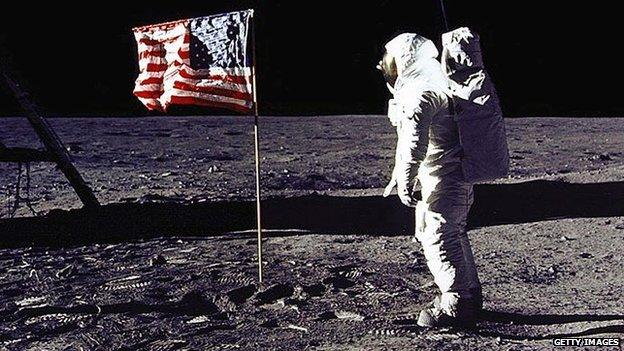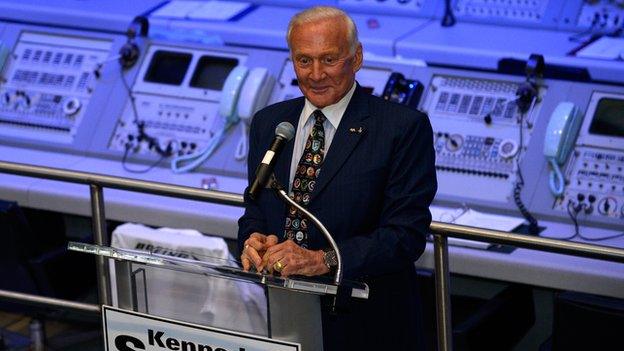Buzz Aldrin's one-way trip to Mars
- Published

Astronaut Buzz Aldrin calls the lunar surface "harsh, desolate, yet magnificent terrain"
A review of the best commentary on and around the world...
Today's must-read
Neil Armstrong's "one small step" onto the moon 45 years ago Sunday was a landmark achievement for humankind, says astronaut Buzz Aldrin. Now, asserts the man who followed Armstrong onto the lunar surface, "more steps are needed to fuel and assure America's leadership role in deep space exploration".
Writing for CNN.com, Mr Aldrin recalls, external the "harsh, desolate, yet magnificent terrain" he observed during his lunar journey:
"The airlessness. Brilliant sunlight illuminated the dust, which was everywhere. And the horizon, visibly curving away in the distance, was so clear because no pollution obscured it."
He says that he was struck how he and his fellow astronauts were embraced by the world when they returned to earth. Now, he says, the US must recapture that global spirit by entering a new era of space exploration.
"We could as a country sit around and do nothing," he says. "On the other hand, we could accept the role of space leadership that we carved out for ourselves in the 1960s and 1970s."
The US objective, he says, shouldn't be a return to the moon. Although such missions have been mentioned by Chinese and Russian officials, "we have blazed that trail", Mr Aldrin writes.

Buzz Aldrin commemorates the 45th anniversary of the lunar landing
"For America, another destination is calling," he says. "America's longer-term goal should be permanent human presence on Mars."
Mr Aldrin's CNN piece is part of the astronaut's promotion tour for his new book, Mission to Mars: My Vision for Space Exploration, in which he expands on his interplanetary goal.
In the book, Mr Aldrin says trip to Mars should be one-way. Humans must travel to the red planet to permanently settle and live out their natural lives - like the Pilgrims, Mr Aldrin tells , externalthe Washington Post's Joel Achenbach.
It can't be a "flags-and-footprints stunt", Achenbach writes.
"If we go and come back, and go and come back, I'm sure Congress will say, 'Oh, we know how to do that, let's spend the money somewhere else'," Aldrin tells Achenbach. "And everything we will have invested will be sloughed aside." he said.
By the 50th anniversary of the lunar landing, Aldrin writes, the US should be on a path toward Mars.
"The Apollo moon program provided one small step," Mr Aldrin concludes. "Other steps lay ahead, strides that take us to the surface of Mars."
Thailand
Thailand's military is working to repair its image, external - Thai generals insist that the military coup that began on 22 May is not an unusual event in the nation's history. Real Clear World's Robert Amsterdam says that world leaders should not accept this claim.
"The junta's transition plan must be rejected and understood for what it is: a blatant attempt by one minority to dominate the majority," says Amsterdam.
Military coups have been a recurring fact of life since Thailand moved away from an absolute monarchy in 1932. Real democracy will never be able to take root in the nation, he says, until world leaders emphatically state that such actions must stop - and take action to back up their words.
Syria
Bashar Assad manoeuvres for an alliance with the US, external - Syrian President Bashar Assad is using the devil's gambit strategy on the US, according to the Atlantic's Dominic Tierney.
"Embattled tyrants like Assad can't usually win international allies with a charm offensive," he writes. "Instead, their best hope for gaining foreign support is to rely on that old adage: the enemy of my enemy is my friend," says Tierney.
Before the US sides with Assad, Tierney cautions, the Obama administration must question what this alliance could mean the long run.
"The devil's gambit provides another argument for early action to prevent civil wars from breaking out or escalating," he says. "Otherwise, we may find that the enemy of our enemy is a fiend."
Sweden
School-choice advocates should learn from Sweden's failures, external - A new study indicates that education levels in Sweden have dropped over the past decade, says Columbia Business School Prof Ray Fisman, and indications are it's due to the country's school-choice voucher reforms.
"The hope was that schools would have clear financial incentives to provide a better education and could be more responsive to customer (ie, parental) needs and wants when freed from the burden imposed by a centralised bureaucracy," he writes in Slate.
But schools didn't improve the quality of their education, he says, they just were more lenient when grading the national tests by which they were judged.
Fisman argues that Americans must take a lesson from Sweden's education failures before they push any further for school choice.
Sudan
The return of the Janjaweed, external - Sudan President Omar al-Bashir has rebuilt the destructive Janjaweed militias as his personal army, writes Columbia University's Ahmed Hussain Adam in the New York Times. Renamed the Rapid Support Forces, Mr Bashir is using these militias to enhance his power in the country.
"In contrast to the army, the Janjaweed has proved a reliable machine of terror with little capacity or ambition to rule," Adam says. "It has no prominent political leaders or educated cadres; it remains mostly a group of fighters for hire, unlikely to challenge Mr Bashir's leadership."
It's time for Sudan's neighbours to step in, Adams writes.
"This means addressing the grievances of Sudan's periphery and ending Khartoum's piecemeal approach to the country's conflicts," he says. "It also means insisting upon the decade-old Security Council resolution that the janjaweed be disarmed, once and for all."
BBC Monitoring's quotes of the day
At least 21 passengers died in a crash on Moscow's Metro on 15 July and more than 150 were injured in the accident in which three carriages derailed on a train during the morning rush hour. Some Russian press commentators suggest the whole Metro system should be looked at to find the reason for the crash.
"In complex technological systems, the cause of failures most often lies in the fact that the work safety zone disappears. It includes keeping machinery in working order, conducting maintenance on time and of an appropriate quality, having highly qualified administrative and maintenance personnel. If there is not enough money for these purposes, or the spending is not controlled, disasters are inevitable."- Bela Lyauv in Vedomosti, external.
"The most overloaded of all Moscow transportation systems must undergo a comprehensive and open audit... The statements that are being made today about perpetrators going to be fired or face criminal proceedings reflect the fleeting political significance of safety issues on the metro." - Nikolay Epple in Vedmosti, external.
Have you found an interesting opinion piece about global issues that we missed? Share it with us via email at echochambers (at) bbc.co.uk.